Power in numbers: Free Spirit reflection
Courtesy of Freedom Forum Institute
Timothy Stolp tells fellow Free Spirits about his experiences with journalism on the LHS Statesman.
This past summer, I attended the 2019 Al Neuharth Free Spirit and Journalism Conference, which has been held in Washington, D.C. for the past 20 years. There, I met 50 outstanding student-journalists from across the nation, one from each state and Washington, D.C. The annual week-long event is an opportunity for aspiring journalists to meet their peers, their predecessors and others who believe in the importance of the press.
Conceived in 1999 by Al Neuharth, founder of USA Today, Freedom Forum and the Newseum, the program exists to honor the famed journalist-entrepreneur’s legacy. Through the generosity of the Freedom Forum and the Newseum, as well as their commitment to the future of the press, the Free Spirit Conference, as us Free Spirit Scholars called it colloquially, is made possible.
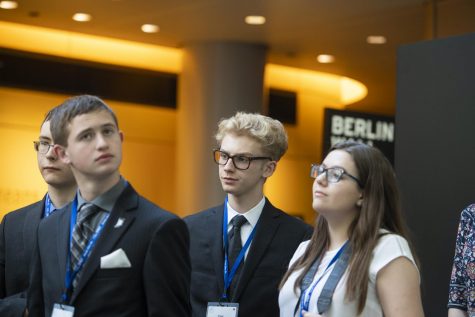
On a tour through the Newseum, Timothy Stolp views a section of the Berlin Wall.
Along with a $1,000 scholarship, Free Spirit Scholars were treated to an all-expenses-paid adventure in the Capitol. We roamed museums (especially the Newseum), we went to fancy restaurants and when we didn’t eat out, we had Wolfgang Puck catered on the exclusive upper-levels of the Newseum; we were given behind-the-scenes passes into governmental buildings and news broadcasts. Every day, we met at least one Pulitzer Prize-winner, it seemed, and a trove of other award-winning journalists. It was an exclusive ticket to the inner workings of the “real world” of journalism, and our schedule was jam-packed.
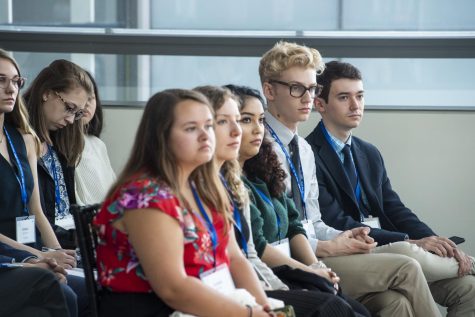
Stolp listens to a speaker at Newseum.
But, when asked to write a reflection on this experience, I realized that none of this made the 2019 Free Spirit conference completely what it was.
We are in the business of truth, the uncovering and distribution of it; we pride ourselves on being unbiased, untouched by the happenings that we report on. Yet, I feel this article would be inconsequential if I didn’t provide the more immaterial truth of the conference as well. Yes, I had a great time; I was lavishing in an experience quite unlike anything I might have again. It is, however, the connections I made with the people I met which turned the trip into a milestone.
On the first night, the staff at the Freedom Forum brought us to the Newseum and gave us the opportunity to share what we found to be the most important of the five freedoms protected within the First Amendment. As each of my peers went up to the microphone to say what they thought, there was an immediate sense of openness to deeper conversation about the state of our nation, the state of the press and the state of freedom in general. It was an important tone to set for the rest of the trip.
I said that, to me, the freedom of assembly is most prevalent, a statement I became even more confident as the week went on. I stated that I believe numbers have great power, and as each voice gets added to the conversation, there is a greater chance of real progress being made. It is because of the collective whole, not in spite of it, that we will be able to make change a reality.
I cannot remember when I first heard the idea that there is power in numbers, but in my 17 years of life, I have seen this truth in action time and time again. And at the Free Spirit Conference, I saw it up close and personal.
After that first encounter with each other, we went to dinner and got to know one another. Throughout the week, it would be the in between moments in which I would connect most with the people around me. We were able to talk about all of the other things that interested us, and I found that, for a lot of us, there seemed to be a general sense of curiosity about anything and everything. My peers were continuously fascinated by new ideas and topics, which I know will lend itself to them becoming great journalists (and having great careers, no matter what field any of the Free Spirits choose).
Our minds were filled to the brim with a variety of perspectives, and many of the speakers reminded us that at the end of the week, it is up to us to decipher what remains most pertinent. Advice is subjective; the truth is personal. The alumni we met were most apt to tell us that they considered a lot of paths before journalism, even after their stay in D.C. at the conference however many years ago. They were reluctant because they were told journalism was dying, but ended up making the decision to stick with it or return to it after college because of its purpose and what it provides them: the opportunity to tell true stories the most efficient way known.
Each speaker frequently challenged my perspective, and remained open to the questions we asked, which ranged from tactical means of bettering high school journalism programs to a Free Spirit’s own writing or broader, philosophical questions about the morality of a situation the speaker or a current journalist may be facing or have faced. I gained a stronger foundation of the principles guiding many of the reporters of today—in comparison with the past, as well, which provided context for the uprooting of many altruisms that previously remained unbudged.
In short, what I saw was that numbers add up. No matter how the dice is rolled, how the cards are dealt or how the story is told, there will always be a greater picture at hand. There are still six sides to every dice, there are still 52 cards in every deck and there are still more than even two sides of every story. At the end of the day, it’s a matter of perspective and looking from every angle before deciphering what it means for yourself. This is why I find the freedom of assembly and any assault on it so important to cover: we must be given the opportunity to see the whole picture, to see everyone’s side. Bigots and their pedantic dogmas do not need to fill the page, it’s simply a matter of discerning what angle to portray them from so as to elucidate their abnormality.
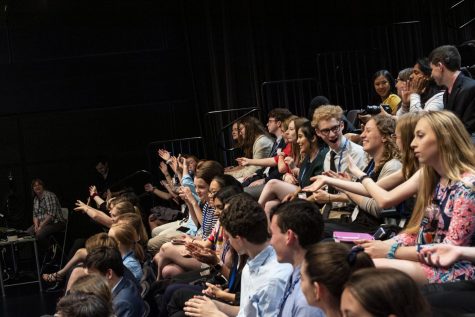
Stolp reacts to information presented at Freedom Sings, or possibly what his friends are saying.
On the second-to-last night of the conference, we again returned to the room where it all started for a concert. I think most of us were expecting dancing and a lack of lecturing, which was not what we got. However, what we did get exceeded our expectations. The Freedom Forum gave us a private showing of Freedom Sings, an educational concert series that tours semi-regularly and teaches about the changing tides of music censorship over time.
What we learned through the songs and the speaker was that, despite our freedoms in the First Amendment, primarily speech in this case, music remains a target of censure. They tracked the history of censorship from Revolutionary times to the current day, the majority of censorship coming with the sea of change during the social movements of the 1960s.
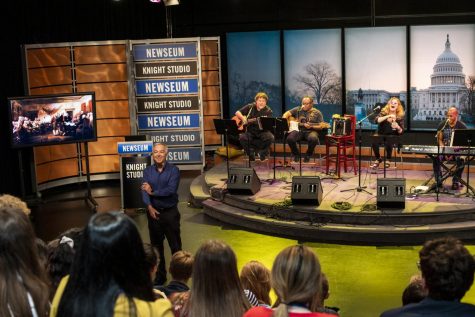
The Freedom Forum Institute hosted a special presentation of Freedom Sings, an educational concert about music censorship through American history.
At the end, the speaker explained the story of “A Change is Gonna Come” by Sam Cooke. He was “the Beyoncé” of the time, he laughingly stated. But it was the 60s and he was unable to enter a lot of spaces that Beyoncé and her contemporaries now occupy. A specific instance at a hotel where his white friends were able to stay, as legend has it, prompted Cooke to go to the back of the tour bus, where he wrote the famous song of progress in just under six minutes. The tune is a swelling and hopeful ode to the trials of a community long-marginalized.
The band sang the song. I think it’s safe to say many of us Free Spirits felt a stirring of emotions. As they faded out, former-President Obama’s inauguration speech came on a TV to the side. In it, he says, “It’s been a long time coming, but tonight, because of what we did on this date in this election at this defining moment, change has come to America.”
Obama’s line mirrors the song directly, “It’s been a long time coming, but I know a change is gonna come.”
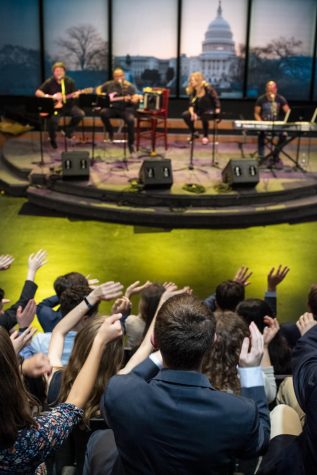
Free Spirits move along to the songs from Freedom Sings.
It took 44 years, but change came; coincidentally, with the 44th President, the mark of a passage into a new era, one with work still to be done, but work that can be done. “Yes we can,” Obama championed as his campaign slogan. The speaker informed us that Cooke was assassinated just four years later by a hotel manager, in a case that would be ruled justifiable homicide. The shocking coincidences of all of this moved me to tears, amplified by the resurgence of the band, finishing the song, which they never concluded in all this exposition.
I looked around as the dim lights came up. The speaker told us he was excited for the future because of our bright faces. I looked at my peers: black, white, Latinx, all genders, gay, straight. I saw them not only for who they were, but for the true power they add to the whole of humanity. This is what made the Free Spirit Conference what it was for me.
Al Neuharth is a very quotable man, and one of his sayings sticks out to me: “The difference between a mountain and a molehill is your perspective.” In speaking with Neuharth’s family, I saw that this man, who grew from an impoverished, single-mother household in smalltown South Dakota, was able to change the face of journalism in a world that needed it. In going forward from the conference, I have carried this mindset of looking at the numbers and deciding what to do from there: taking risks and being bold, but not without good reason.
The Al Neuharth Free Spirit and Journalism Conference is the chance of a lifetime for those interested in press and protecting the freedoms that allow for liberty of the mind. I am grateful to have had the experience and learned from it what I did: every day, there is the possibility of creating good action, so get out there, figure out the puzzle, add it all up and write that story.
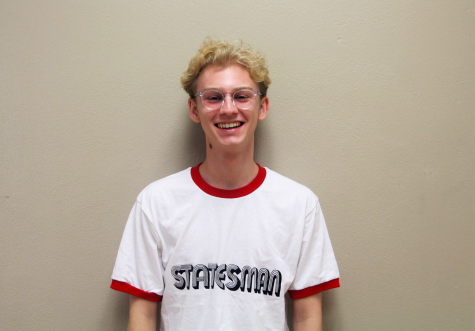
Timothy Stolp is excited to be one of four Co-Editors-in-Chief of the Statesman as an LHS senior this year. Though his focus will be on the paper issues,...


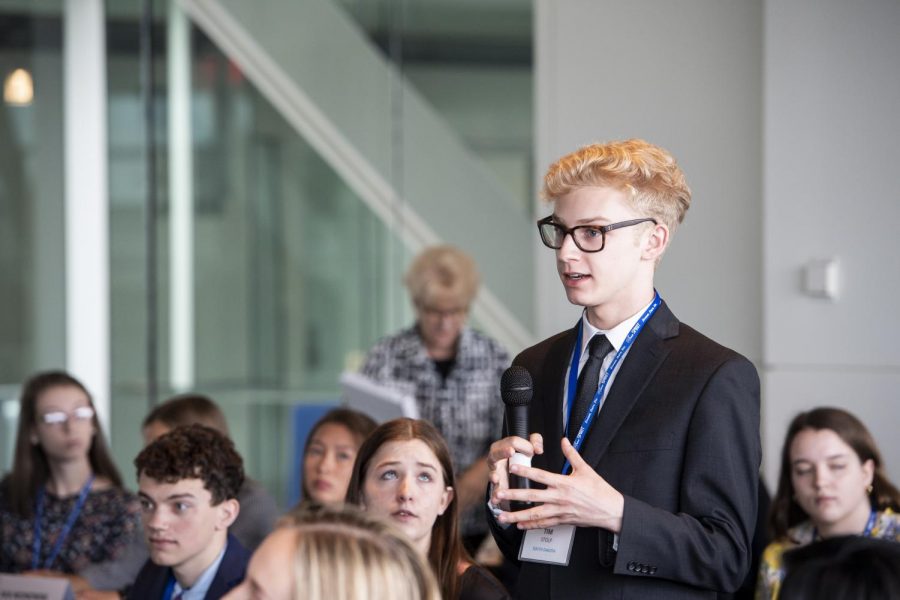
grace • Dec 1, 2019 at 11:34 pm
timothy you’re excellent and amazing and i love this and you